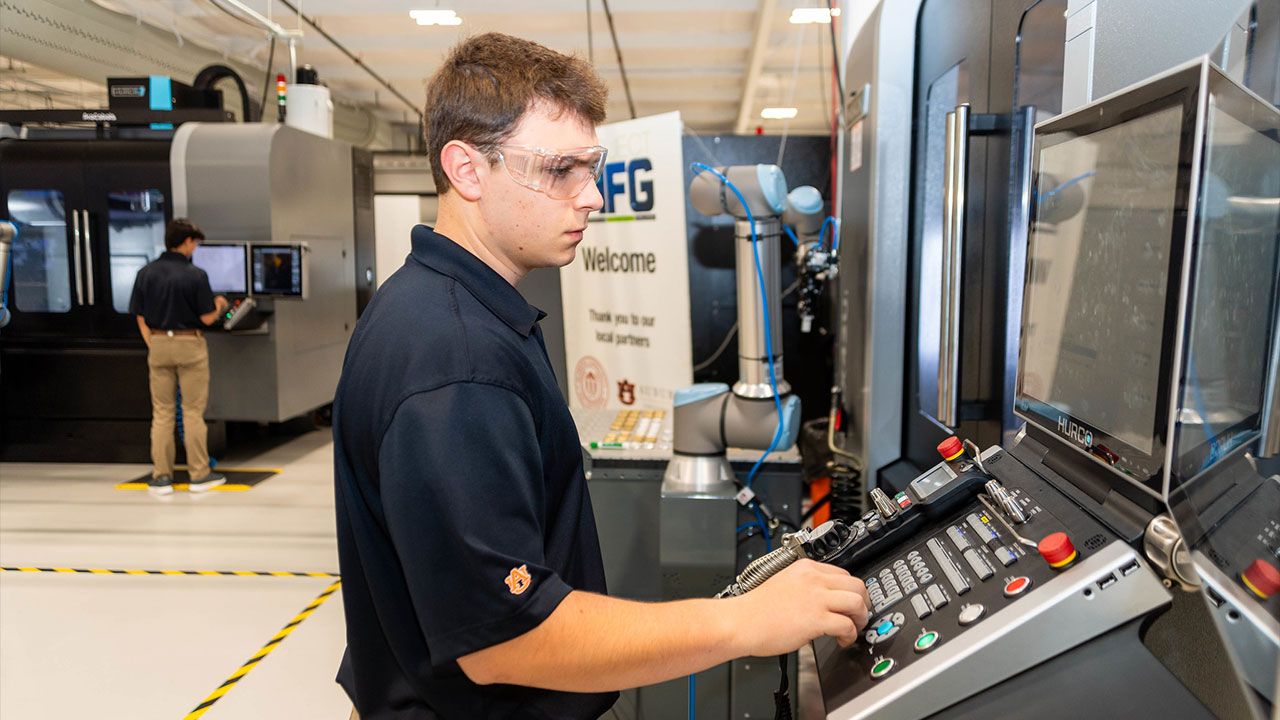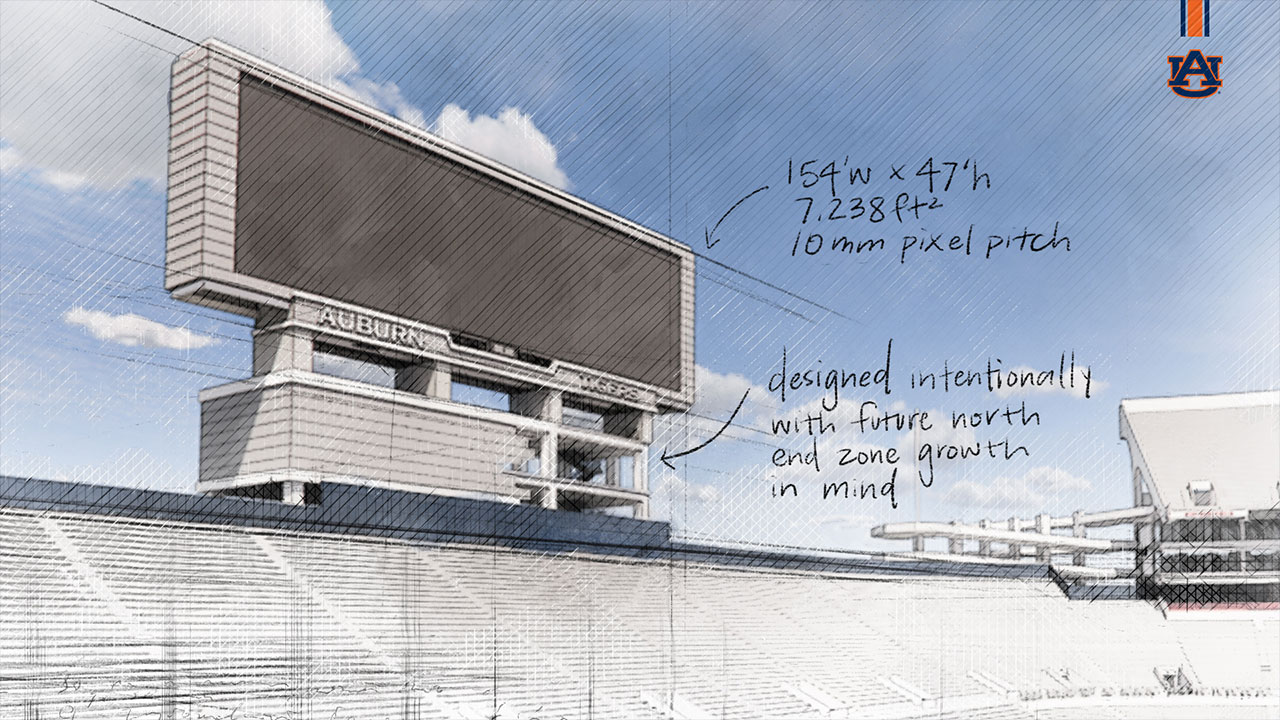content body

Auburn University continues to take steps to address needs in Alabama and beyond. Its latest endeavor involves extending its support for the state’s capabilities in advanced manufacturing: the use of innovative techniques and technology to improve the productivity and efficiency of manufacturing.
The Samuel Ginn College of Engineering will create an Analytical, Innovation and Manufacturing Laboratory to specifically foster workforce development, interdisciplinary collaboration and industry-relevant research and innovation aimed broadly at advanced manufacturing.
The university’s Board of Trustees accepted the project’s initiation at its June 7 meeting, which will be funded by the state legislature with FY23 supplemental appropriations. Facilities Management will now search for an architect to renovate 16,000 square feet of space beneath the Gavin Garden.
“Auburn University stands as a premier institution in the country for advanced manufacturing due to its cutting-edge research, state-of-the-art facilities and unwavering commitment to advancing the field,” said Allan David, associate dean for research in the Ginn College of Engineering. “Our interdisciplinary approach, coupled with industry partnerships, ensures that Auburn remains at the forefront of advanced manufacturing innovation, preparing the next generation of leaders to drive industry growth and technological advancement.”
Advanced manufacturing at Auburn is strongly sustained by its Interdisciplinary Center for Advanced Manufacturing Systems (ICAMS), which offers equipment, space and expertise to train and educate students and industry personnel in advanced manufacturing technologies while also focusing on reducing the barriers inhibiting the introduction of advanced manufacturing systems in small and medium manufacturing operations.
For small- and medium-sized manufacturers (SMMs), Greg Harris, ICAMS director and chair of the Department of Industrial and Systems Engineering, said ICAMS is “the trusted third party that they can come to with questions they may have on technology adoption. We also help these companies implement the technologies through outreach and training for the workforce to utilize these technologies.”
He added that ICAMS’ longitudinal study of technology adoption by SMMs has been referenced in Senate and House Committee meetings as a national policy for advanced manufacturing has been discussed.
Additionally, ICAMS promotes educational opportunities through new graduate and undergraduate certificates and a new minor in advanced manufacturing at Auburn and research to create and advance technologies for manufacturing. The courses for these certificates and minor will be offered this fall.
ICAMS has a strong and burgeoning relationship with the U.S. Department of Defense (DOD). The center recently received a $1.7 million DOD grant to expand the Bird Inc. program, an outreach program aimed at exposing middle school students to manufacturing jobs.
Harris said ICAMS personnel have made over 700 demonstrations of digital manufacturing technologies in the past two years and promoted manufacturing as a career to over 1,900 middle school students in the last year. The DOD grant will allow ICAMS to foster manufacturing to 28,000 Alabama middle schoolers over the next two years.
A new lab for future progress
The planned renovations to create the Analytical, Innovation and Manufacturing Laboratory will feature new laboratories focused on manufacturing, material analysis and testing. It will also offer collaborative and innovative spaces to encourage idea generation and project development, promoting an active environment for entrepreneurship and technological progress.
David said the new facility will continue to put Auburn and the Ginn College of Engineering at the top of universities for advanced manufacturing.
Additionally, the National Center for Additive Manufacturing Excellence (NCAME), the Center for Polymers and Advanced Composites (CPAC) and the Auburn University Electronics Packaging Research Institute — formerly named the Center for Advanced Vehicle and Extreme Environment Electronics (CAVE3) — will also be major players utilizing the new lab space.
In FY23, ICAMS, NCAME, CPAC and CAVE3 collectively received more than $29 million in funded research to improve advanced manufacturing in the United States.
The Gavin Garden is located between the Gavin Engineering Research Laboratory and the Brown-Kopel Engineering Student Achievement Center. It is the largest rooftop garden on campus, as research and workspaces exist underneath it. The area below the garden is accessible from the bottom levels of either building.
Budget preview
Also at the board meeting, Kelli Shomaker, Auburn’s senior vice president for business and administration and chief financial officer, updated the board on FY25 budget preparations. She discussed several key revenue and expense line items in the unrestricted budget, including an increase in state appropriations of $28 million and tuition and fee revenue by $34 million, as well as increases in unrestricted expenditures of $30 million for merit increases for faculty and staff, $20 million additional contingency and increases for technology, subscription services, security, insurance and repair and renovation.
A final FY25 budget, including unrestricted, restricted and auxiliary revenues and expenses, will be brought to the board at its September meeting for approval.

Updating Jordan-Hare
Auburn football fans will have a new videoboard for the north end zone of Jordan-Hare Stadium for the 2025 season. The board granted final approval to the project with an estimated cost of $25.7 million, to be paid with gifts and funds from Auburn Athletics.
Auburn Athletics sought replacement of the existing north end zone scoreboard, which was originally installed in 1987, to provide an improved gameday experience, notably for south end zone fans, including the student section who will have a clear view of the new videoboard.
LBYD Engineers of Birmingham, Alabama, was previously selected as the project engineer. The firm was responsible for the south end zone videoboard.
Nine years ago, when the Board of Trustees first heard a proposal to replace the 40-year-old south end zone scoreboard and camera platform, the $13.9 million cost covered a new scoreboard, installation, a new audio system and electronic ribbon boards on the upper decks. The new board, then dubbed the largest videoboard in college football at 57 feet tall and 190 feet wide, was unveiled at the start of Auburn’s 2015 season.
The design in the south end zone allowed for a 12-story structural steel tower to support the 50-ton videoboard. On the other hand, the proposed north end zone videoboard will be supported by a concrete frame structure on the outside of the stadium.
This decision is the first step toward modernizing the north end zone of Jordan-Hare. The videoboard and supporting structure will stand alone behind the current seating bowl, enabling future improvement opportunities utilizing the concrete frame.
The concrete base structure is also expected to provide an expanded north end zone concourse, allowing for additional food and beverage offerings while easing the flow of fans around the main concourse level.
At approximately 47 feet tall and 154 feet wide, totaling 7,238 square feet of LED space, the new videoboard will be roughly two-thirds the size of the south end zone videoboard.
It will be the sixth-largest videoboard in the Southeastern Conference and a top-20 collegiate videoboard in the country. The two videoboards combined will feature the most LED square footage of videoboard among all SEC schools.
Additionally, the board granted final approval to the following projects:
- A studio theatre and amphitheatre build out at the Jay and Susie Gogue Performing Arts Center. The project consists of extending and enclosing a section of the existing outdoor stage to create a studio theatre, constructing a new exterior stage and enhancing the existing amphitheatre. Additionally, the project includes provisions for additional food service and ticketing support. The estimated total project cost of $15 million will be financed by gift funds. Wilson Butler Architects of Boston was previously selected as the project architect.
- A Board of Trustee-initiated addition to the university events center on South College Street near Garden Drive. Currently, the center consists of an indoor area and an outdoor section that is often enclosed by a tent. This project will involve making safety and ADA improvements, constructing a one-story building addition and renovating the existing facility to create an expanded air-conditioned event space and storage and office spaces for the university’s Special Events staff. The upgrades will reduce recurring expenses associated with the previous use of temporary sites. The estimated total project cost of $14 million will be financed by gifts and university general funds. Architecture Works of Birmingham, Alabama, was previously selected as the project architect. Completion of this project will allow for the potential demolition of Terrell Hall at some point in the future.
The board initiated the following projects:
- A plan to renovate the patio at the Melton Student Center. Student Affairs endorses the Student Government Association’s plan to renovate the center’s patio to improve student life and involvement. The project intends to optimize the use of outdoor areas next to busy student zones, create a medium-sized outdoor space with audiovisual facilities for holding various events, add outdoor study seats with power outlets and enhance the gameday experience by expanding outdoor seating capacity and installing a video screen for showing games and events. Student Affairs will likely finance the project.
- A plan to renovate and repair the Rural Studio’s Red Barn in Newbern, Alabama. The College of Architecture, Design and Construction (CADC) has proposed a comprehensive renovation, including structural repairs, enhancements to life-safety systems and accessibility and alterations to the space to accommodate the current requirements of the program. The objective is to bring the facility up to current building codes and standards and provide adequate studio and lecture space for architecture students in the Rural Studio program. CADC and the Office of the Provost will likely finance the project.
In other matters, the board:
- Granted the university permission to sell land in Talbot County, Georgia. A 731-acre parcel of land was gifted to the university in 2016 for the benefit of the Harbert College of Business. The college has recommended the sale, with the revenue devoted to its capital needs. Auburn has negotiated a purchase and sale agreement with Hat Creek Land LLC.
- Granted the university permission to acquire property at 828 S. College Street in Auburn. The purchase will create a five-acre plot at the intersection of Woodfield Drive and South College Street that will not only improve the aesthetics at a major entry point to campus, but the university can use the land for future development.
- Closed the degree program for a Bachelor of Science in industrial design studies in the College of Architecture, Design and Construction.
- Accepted certain changes to faculty personnel policies in the university’s Faculty Handbook.
- Named PricewaterhouseCoopers as the university’s external auditors.
- Elected Jimmy Sanford as vice president pro tempore and Quentin Riggins as president pro tempore of the board for 2024-25. Riggins was initially named president pro tempore of the board a year ago, making him the first African American to serve in the role.
- Recognized Jennifer Mueller-Phillips, who began her role as the new dean of the Harbert College of Business on May 1. A member of the Auburn faculty since 2000, Mueller-Phillips had been the college’s interim dean for eight months before being named to the permanent position.
- Recognized mechanical engineering professor David “Doc” Dyer for 59 years of service to Auburn. He retires with the distinction of Auburn’s longest-serving faculty member in university history. The acknowledgment was personal for President Christopher B. Roberts, as he and Dyer had been department chairs together in the Samuel Ginn College of Engineering for decades. Dyer said his job was easy all these years because Auburn has the best students.
- Recognized the men’s golf team, represented by coach Nick Clinard, for winning its first national championship on May 31. Clinard was later named the 2024 national coach of the year.
- Was reminded that Facilities Management has webcams to show the construction progress of current capital projects, including the College of Education building, STEM + Ag Complex and new student housing.




